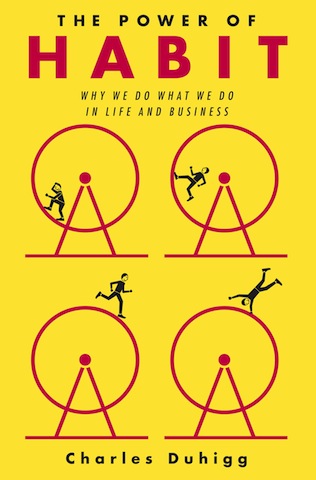 |
[Editor’s note: The following is an excerpt from Charles Duhigg’s best-selling The Power of Habit: Why We Do What We Do in Life and Business, which explores the science of habit formation in our lives, companies and societies. Duhigg will be keynoting PR News’ Platinum PR Awards luncheon on Sept. 14 at New York’s Grand Hyatt.]
I ï¬rst became interested in the science of habits eight years ago, as a newspaper reporter in Baghdad. The U.S. military, it occurred to me as I watched it in action, is one of the biggest habit-formation experiments in history. Basic training teaches soldiers carefully designed habits for how to shoot, think and communicate under ï¬re.
On the battleï¬eld, every command that's issued draws on behaviors practiced to the point of automation. The entire organization relies on endlessly rehearsed routines for building bases, setting strategic priorities and deciding how to respond to attacks. In those early days of the war, when the insurgency was spreading and death tolls were mounting, commanders were looking for habits they could instill among soldiers and Iraqis that might create a durable peace.
I had been in Iraq for about two months when I heard about an ofï¬cer conducting an impromptu habit modiï¬cation program in Kufa, a small city 90 miles south of the capital. He was an army major who had analyzed videotapes of recent riots and had identiï¬ed a pattern: Violence was usually preceded by a crowd of Iraqis gathering in a plaza or other open space and, over the course of several hours, growing in size. Food vendors would show up, as well as spectators. Then, someone would throw a rock or a bottle and all hell would break loose.
When the major met with Kufa's mayor, he made an odd request: Could they keep food vendors out of the plazas? Sure, the mayor said. A few weeks later, a small crowd gathered near the Masjid al-Kufa, or Great Mosque of Kufa.
Throughout the afternoon, it grew in size. Some people started chanting angry slogans. Iraqi police, sensing trouble, radioed the base and asked U.S. troops to stand by. At dusk, the crowd started getting restless and hungry. People looked for the kebab sellers normally ï¬lling the plaza, but there were none to be found. The spectators left. The chanters became dispirited. By 8 p.m., everyone was gone.
When I visited the base near Kufa, I talked to the major. You wouldn't necessarily think about a crowd's dynamics in terms of habits, he told me. But he had spent his entire career getting drilled in the psychology of habit formation.
At boot camp, he had absorbed habits for loading his weapon, falling asleep in a war zone, maintaining focus amid the chaos of battle and making decisions while exhausted and overwhelmed. He had attended classes that taught him habits for saving money, exercising each day and communicating with bunkmates.
As he moved up the ranks, he learned the importance of organizational habits in ensuring that subordinates could make decisions without constantly asking permission, and how the right routines made it easier to work alongside people he normally couldn't stand. And now, as an impromptu nation builder, he was seeing how crowds and cultures abided by many of the same rules.
In some sense, he said, a community was a giant collection of habits occurring among thousands of people that, depending on how they're influenced, could result in violence or peace. In addition to removing the food vendors, he had launched dozens of different experiments in Kufa to influence residents' habits. There hadn't been a riot since he arrived.
"Understanding habits is the most important thing I've learned in the army," the major told me. "It's changed everything about how I see the world. You want to fall asleep fast and wake up feeling good? Pay attention to your nighttime patterns and what you automatically do when you get up. You want to make running easy? Create triggers to make it a routine. I drill my kids on this stuff. My wife and I write out habit plans for our marriage. This is all we talk about in command meetings. Not one person in Kufa would have told me that we could influence crowds by taking away the kebab stands, but once you see everything as a bunch of habits, it's like someone gave you a flashlight and a crowbar and you can get to work."
The major was a small man from Georgia. He was perpetually spitting either sunflower seeds or chewing tobacco into a cup. He told me that prior to entering the military, his best career option had been repairing telephone lines, or, possibly, becoming a methamphetamine entrepreneur, a path some of his high school peers had chosen to less success. Now, he oversaw eight hundred troops in one of the most sophisticated ï¬ghting organizations on earth.
"I'm telling you, if a hick like me can learn this stuff, anyone can. I tell my soldiers all the time, there's nothing you can't do if you get the habits right."
In the past decade, our understanding of the neurology and psychology of habits and the way patterns work within our lives, societies and organizations has expanded in ways we couldn't have imagined ï¬fty years ago. We now know why habits emerge, how they change and the science behind their mechanics.
We know how to break them into parts and rebuild them to our speciï¬cations. We understand how to make people eat less, exercise more, work more efï¬ciently and live healthier lives. Transforming a habit isn't necessarily easy or quick. It isn't always simple.
But it is possible. And now we understand how.
The Power of Habit: Why We Do What We Do in Life and Business is available at Randomhouse.com. Register now to hear from Duhigg at PR News' Sept. 14 Platinum PR Awards Luncheon.
